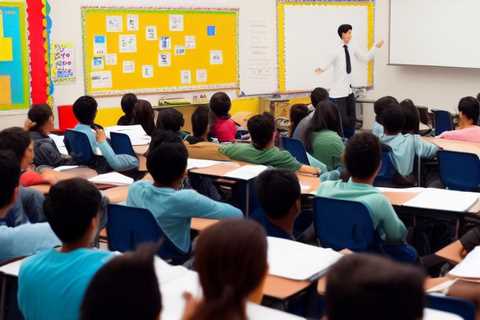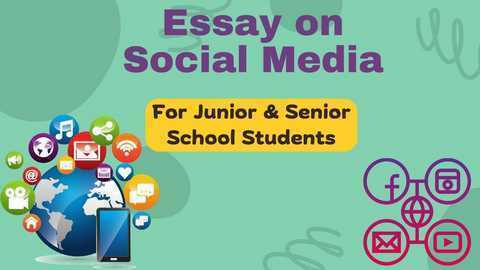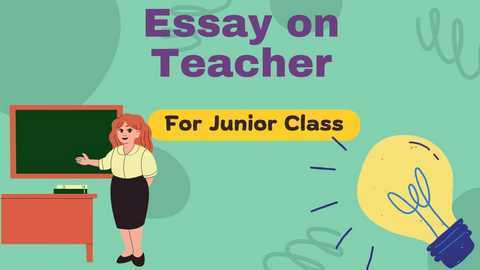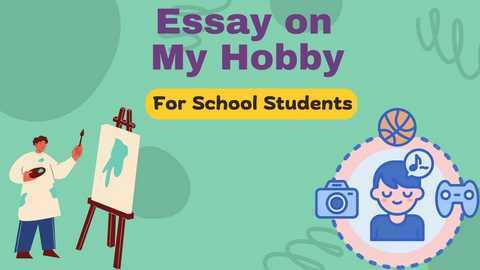There is a great importance of education in our daily lives.
Education holds immense significance in shaping individuals and societies, acting as a powerful catalyst for personal growth, social progress, and economic development.
This essay explores the multifaceted importance of education, emphasizing its transformative power and the myriad benefits it offers.
By recognizing and embracing the importance of education, we pave the way for a brighter future, where opportunities are abundant and potential is unleashed.

10 Liner Essay on Importance of Education
1. Education is the foundation for personal growth and societal development.
2. It empowers individuals with knowledge, skills, and critical thinking abilities.
3. Education opens doors of opportunity, unlocking a world of possibilities.
4. It nurtures creativity, curiosity, and a lifelong love for learning.
5. Education promotes social progress, fostering empathy and understanding.
6. It equips individuals with the tools to navigate challenges and make informed decisions.
7. Education instills values and ethics, shaping responsible global citizens.
8. It drives economic growth by preparing individuals for the workforce.
9. Education unlocks the potential within individuals, providing them with the necessary tools and knowledge to pursue their passions and aspirations, thereby emphasizing the importance of education.
10. Ultimately, education is the key to a brighter future for individuals and society as a whole.
Essay on Importance of Education (100-150 Words)
Education is incredibly important, playing a central role in shaping both individuals and communities.
It acts as a key that unlocks doors to countless opportunities, allowing people to broaden their horizons and achieve their full potential.
Education provides us with more than just knowledge; it equips us with essential skills and critical thinking abilities that are vital for navigating life’s challenges.
It empowers individuals to grow personally, discover their passions, talents, and aspirations.
Furthermore, education promotes social progress by fostering empathy, understanding, and respect for diverse perspectives.
It is also an essential driver of economic development, as it equips individuals with the tools they need to succeed in their chosen careers.
In essence, the importance of education lies in its power to create a brighter future where everyone, irrespective of their background, has the opportunity to thrive and make a meaningful contribution to society.
Essay on Importance of Education (250 Words)
Education is like a guiding light that illuminates our path and empowers us to shape a brighter future.
It holds the key to unlocking a world of opportunities, enabling personal growth and societal progress.
In an ever-changing world, education equips us with the knowledge, skills, and values we need to navigate challenges and make a positive impact.
At its core, education is a gateway to unleashing our full potential.
It goes beyond textbooks and classrooms, fueling our curiosity and igniting a lifelong thirst for learning.
From mastering the basics to tackling complex concepts, education expands our horizons and nurtures critical thinking.
It encourages creativity and problem-solving, enabling us to adapt, innovate, and thrive in a dynamic society.
But education is more than just acquiring knowledge; it encompasses the richness of our experiences and the wisdom shared by those around us.
It shapes our character, instilling values of empathy, compassion, and respect. Education fosters a sense of global citizenship, empowering us to contribute meaningfully to our communities and work towards a fairer world for all.
Furthermore, education is a transformative journey of self-discovery.
It encourages us to explore our passions, talents, and interests. It helps us build confidence, identify our strengths, and overcome our weaknesses.
With education as our ally, we are empowered to pursue our dreams, chase our aspirations, and forge fulfilling careers.
In essence, education is a powerful force that has the potential to change lives and shape societies.
It is an investment in our future, providing us with the tools to overcome obstacles and seize opportunities.
Let us recognize the profound value of education and work together to ensure that every individual has access to quality education, unlocking boundless possibilities for personal growth and collective progress.
Essay on Education for Students (500-600 Words)
Education is a transformative force that shapes individuals and societies, opening doors of opportunity and empowering people to reach their full potential.
In this essay, we will delve into the multifaceted importance of education and its profound impact on personal growth, social progress, and global development.
Building a Foundation for Knowledge
Early Learning and Literacy
In the early years of education, children embark on a journey of discovery, laying the groundwork for their future academic pursuits.
Education provides them with the building blocks of knowledge, starting with essential skills like literacy.
Learning to read and write opens doors to a vast world of information, fostering communication, critical thinking, and imagination.
Numeracy and Problem-Solving
Education also equips children with numeracy skills, enabling them to comprehend and navigate the world of numbers.
Through mathematics and problem-solving exercises, they develop analytical thinking, logical reasoning, and the ability to tackle real-life challenges.
These skills form the bedrock of future academic and professional achievements.
Empowering Individuals for Success
Unlocking Potential and Self-Discovery
Education is a catalyst for personal growth, enabling individuals to uncover their strengths, interests, and aspirations.
It provides a platform for self-discovery, helping individuals identify their unique talents and passions.
Through exposure to various subjects and extracurricular activities, education empowers individuals to explore their potential, fostering self-confidence and shaping their identities.
Developing Critical Thinking and Problem-Solving Skills
Education cultivates critical thinking, enabling individuals to question, analyze, and evaluate information.
It encourages independent thought, creativity, and the ability to solve complex problems.
By nurturing these skills, education prepares individuals to navigate an increasingly complex and interconnected world, equipping them with the tools to make informed decisions and contribute meaningfully to society.
Fostering Social Progress and Global Citizenship
Cultivating Empathy and Understanding
Education goes beyond individual growth; it plays a vital role in fostering empathy, compassion, and a sense of understanding towards others.
Through exposure to diverse cultures, histories, and perspectives, education promotes respect, tolerance, and appreciation for the richness of human diversity.
It nurtures global citizens who are equipped to navigate multicultural environments and work towards a more inclusive and harmonious world.
Instilling Values and Ethical Principles
Education plays a crucial role in instilling values and ethical principles in individuals.
It promotes qualities such as honesty, integrity, and social responsibility.
By emphasizing moral values, education helps shape individuals who are not only successful in their chosen fields but also contribute positively to their communities and the wider society.
Driving Economic Growth and Innovation
Equipping Individuals with Marketable Skills
Education is an essential driver of economic growth and development.
It equips individuals with the skills and knowledge necessary to thrive in a competitive job market.
By providing vocational training and specialized education, it prepares individuals for specific careers, enhancing their employability and contributing to economic productivity.
Promoting Innovation and Entrepreneurship
Education fosters a culture of innovation and entrepreneurship by nurturing creativity, problem-solving, and critical thinking abilities.
It encourages individuals to think outside the box, develop new ideas, and pursue entrepreneurial ventures.
This entrepreneurial spirit drives economic innovation, job creation, and societal progress.
Conclusion
Education is a powerful tool that shapes individuals, communities, and nations.
It builds a strong foundation of knowledge, empowers individuals to reach their full potential, fosters social progress and global citizenship, and drives economic growth
Essay on Importance of Education (1200-1500 Words)
Education is a fundamental aspect of human development and progress.
It plays a vital role in shaping individuals, societies, and the world at large.
The significance of education cannot be overstated, as it influences personal growth, social development, economic prosperity, and global understanding.
This essay delves into the multifaceted importance of education, exploring its impact on knowledge acquisition, personal empowerment, economic growth, social equality, and global citizenship.
Introduction
Education is the key that unlocks doors to knowledge, opportunities, and personal growth.
It equips individuals with the necessary skills, knowledge, and values to navigate the complexities of life and contribute meaningfully to society.
Education encompasses formal schooling, but it extends beyond classrooms and textbooks.
It is a lifelong process that empowers individuals to think critically, communicate effectively, and adapt to an ever-changing world.
The Significance of Education
a. Education as a Path to Knowledge
At its core, education is about acquiring knowledge and understanding.
It provides individuals with the tools to explore various disciplines, broaden their intellectual horizons, and gain insights into the complexities of the world.
Education instills a thirst for learning and empowers individuals to seek knowledge independently, fostering a culture of curiosity and intellectual growth.
b. Enhancing Personal Development
Education is instrumental in nurturing personal development.
It cultivates essential skills such as critical thinking, problem-solving, and creativity.
These skills enable individuals to adapt to new situations, make informed decisions, and contribute innovatively to their chosen fields.
Education also helps individuals develop self-awareness, emotional intelligence, and social skills, fostering personal growth and well-being.
c. Opening Doors of Opportunity
Education is a powerful catalyst for social mobility and equal opportunity.
It provides individuals with the qualifications and credentials necessary to access higher education, secure employment, and pursue fulfilling careers.
Education opens doors to a range of opportunities, empowering individuals to break free from cycles of poverty and transform their lives.
d. Empowering Individuals and Communities
Education empowers individuals to become active participants in their communities and agents of change.
It equips them with the knowledge and skills to engage in civic activities, contribute to social development, and advocate for positive transformation.
Through education, individuals become informed citizens who can critically analyze societal issues, challenge injustice, and work towards a fair and inclusive society.
Education and Economic Growth
a. Bridging the Skills Gap
Education plays a crucial role in bridging the skills gap between the demands of the job market and the available workforce.
By equipping individuals with relevant knowledge and skills, education enables them to meet the requirements of the evolving labor market.
A well-educated workforce fosters productivity, innovation, and economic growth.
b. Fostering Innovation and Creativity
Education nurtures creativity and fosters innovation.
It provides individuals with the knowledge and skills needed to think critically, solve complex problems, and approach challenges with innovative solutions.
Through educational experiences that encourage exploration, experimentation, and interdisciplinary learning, individuals are inspired to push boundaries, think outside the box, and contribute to advancements in various fields.
c. Reducing Poverty and Inequality
Education is a powerful tool in reducing poverty and promoting social equality.
It equips individuals with the skills and knowledge necessary to secure better job opportunities, increase earning potential, and improve their socioeconomic status.
By providing access to quality education for marginalized and disadvantaged communities, society can break the cycle of poverty and create a more equitable society.
Importance of Education for Social Development
a. Promoting Social Equality
Education has the potential to promote social equality by ensuring equal access to quality education for all individuals, regardless of their socioeconomic background, gender, ethnicity, or ability.
When education is inclusive and equitable, it becomes a powerful force in dismantling barriers and fostering social cohesion, tolerance, and understanding.
b. Building Stronger Communities
Education plays a pivotal role in building stronger communities.
It fosters a sense of belonging, encourages civic engagement, and promotes active participation in community development initiatives.
Well-educated individuals are more likely to contribute positively to their communities, volunteer their time and skills, and collaborate with others to address local challenges.
c. Combating Ignorance and Prejudice
Education is a potent antidote to ignorance, prejudice, and discrimination.
It provides individuals with the knowledge and understanding necessary to challenge stereotypes, combat biases, and promote inclusivity and acceptance.
Education cultivates empathy, cultural sensitivity, and a global perspective, empowering individuals to navigate a diverse world with respect and compassion.
Education and Personal Empowerment
a. Developing Critical Thinking Skills
Education fosters critical thinking skills, enabling individuals to analyze information, evaluate evidence, and make informed decisions.
It encourages questioning, curiosity, and independent thought, empowering individuals to navigate the complexities of life, challenge assumptions, and form well-reasoned opinions.
b. Improving Communication and Collaboration
Education equips individuals with strong communication and collaboration skills.
Through interactive learning experiences, teamwork, and effective communication exercises, individuals develop the ability to express their ideas clearly, listen actively, and collaborate with others to achieve common goals.
These skills are vital not only in academic and professional settings but also in personal relationships and social interactions.
c. Nurturing Emotional Intelligence
Education goes beyond academics and encompasses the development of emotional intelligence.
It helps individuals understand and manage their emotions, empathize with others, and build meaningful relationships.
Emotional intelligence skills, such as self-awareness, empathy, and interpersonal skills, are crucial for personal well-being, success in relationships, and navigating the complexities of the modern world.
Education for Global Citizenship
a. Cultivating Cultural Awareness
Education fosters cultural awareness and appreciation by exposing individuals to diverse perspectives, histories, and traditions.
It encourages individuals to embrace cultural differences, challenge stereotypes, and cultivate a sense of global citizenship.
Through education, individuals develop the ability to navigate cultural complexities, collaborate across borders, and contribute to a more interconnected and inclusive world.
b. Encouraging Tolerance and Respect
Education plays a pivotal role in promoting tolerance, respect, and acceptance of diversity.
By providing individuals with opportunities to learn about different cultures, religions, and worldviews, education fosters understanding, empathy, and an appreciation for the richness of human diversity.
It enables individuals to reject prejudice, combat discrimination, and contribute to a harmonious and inclusive society.
c. Addressing Global Challenges
Education equips individuals with the knowledge and skills needed to address global challenges.
From environmental sustainability to social justice issues, education empowers individuals to become active global citizens who can contribute to positive change.
By raising awareness, fostering critical thinking, and promoting collaborative problem-solving, education plays a crucial role in creating a more sustainable, just, and peaceful world.
Conclusion
Education is an indispensable tool for personal growth, social development, economic prosperity, and global understanding.
It empowers individuals to acquire knowledge, develop essential skills, and become active participants in their communities and the world.
From bridging the skills gap to fostering innovation, from promoting social equality to nurturing personal empowerment, education is a transformative force that shapes individuals, societies, and the future.
In a rapidly changing world, the importance of education cannot be underestimated.
It is crucial for individuals to have access to quality education that promotes inclusivity, fosters critical thinking, and prepares them to navigate the complexities of the modern world.
By recognizing and investing in the significance of education, we can unlock the potential of individuals, create equitable societies, and build a brighter future for all.
FAQs on Importance of education (Frequently Asked Questions)
A. Education contributes to economic growth by bridging the skills gap, fostering innovation and creativity, and reducing poverty and inequality. A well-educated workforce drives productivity, stimulates entrepreneurship, and attracts investment, leading to economic prosperity.
A. Education promotes social equality by ensuring equal access to quality education for all individuals, regardless of their background. It empowers marginalized communities, reduces disparities, and creates opportunities for social mobility and upward mobility.
A. Education fosters personal empowerment by developing critical thinking skills, improving communication and collaboration abilities, and nurturing emotional intelligence. It equips individuals with the tools to navigate life, make informed decisions, and lead fulfilling lives.
A. Education cultivates cultural awareness, encourages tolerance and respect, and addresses global challenges. It prepares individuals to engage in a diverse world, appreciate different perspectives, and contribute to creating a more interconnected and inclusive global community.
A. Education combats ignorance and prejudice by providing individuals with knowledge, promoting critical thinking, and fostering empathy and understanding. It challenges stereotypes, encourages open-mindedness, and promotes inclusivity and acceptance.




